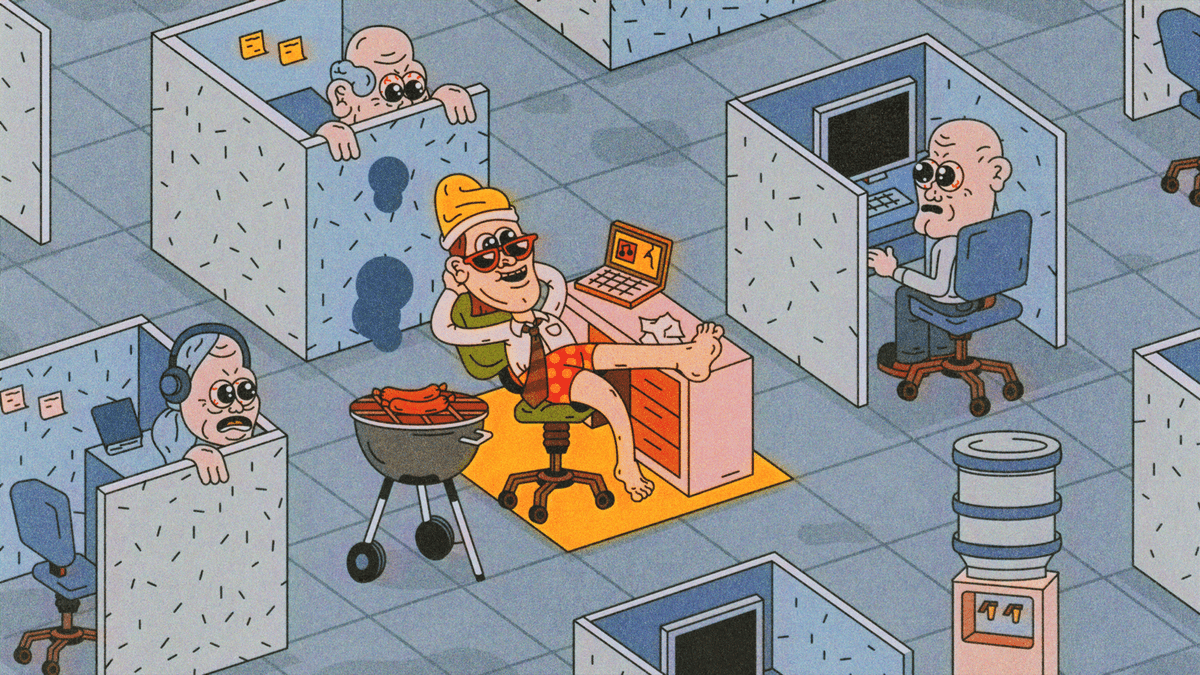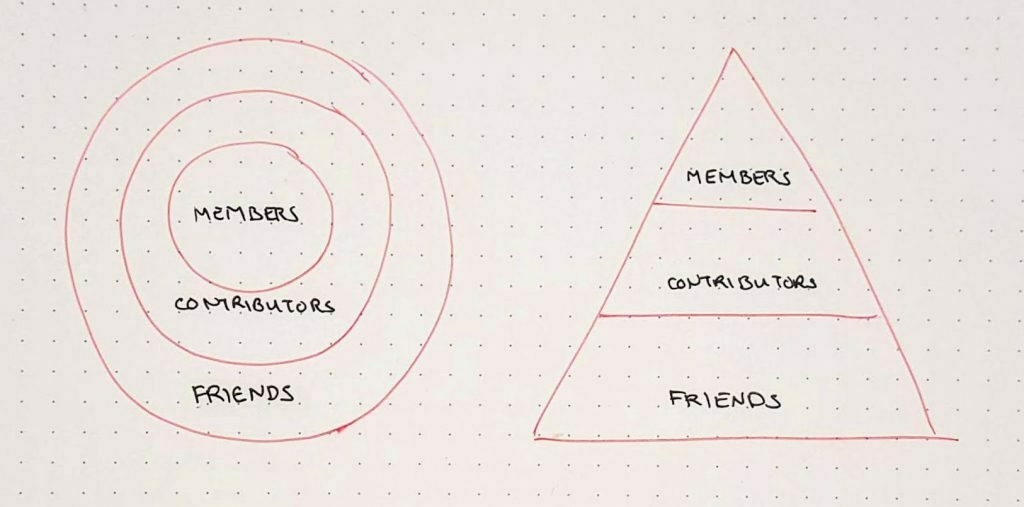-
Assuming you’re hiring good people, it’s very likely they do have other options. It might be a pain for someone to leave and find another job, but generally it’s something people are able to do.
-
Using someone’s paycheck as your primary leverage might be effective in the very short-term, but it’s rarely a way to build or retain an engaged, invested staff in the long-term.
- How good you are
- How many people that influence hiring decisions know how good you are
- Our inability to distinguish between confidence and competence
- Our love of charasmatic individuals
- The allure of “people with grandiose visions that tap into our own narcissism”
- You Shouldn’t Have to Be Good at Your Job (GEN) — "This is how the 1% justifies itself. They are not simply the best in terms of income, but in terms of humanity itself. They’re the people who get invited into the escape pods when the mega-asteroid is about to hit. They don’t want a fucking thing to do with the rest of the population and, in fact, they have exploited global economic models to suss out who deserves to be among them and who deserves to be obsolete. And, thanks to lax governments far and wide, they’re free to practice their own mass experiments in forced Darwinism. You currently have the privilege of witnessing a worm’s-eye view of this great culling. Fun, isn’t it?"
- We've spent the decade letting our tech define us. It's out of control (The Guardian) — "There is a way out, but it will mean abandoning our fear and contempt for those we have become convinced are our enemies. No one is in charge of this, and no amount of social science or monetary policy can correct for what is ultimately a spiritual deficit. We have surrendered to digital platforms that look at human individuality and variance as “noise” to be corrected, rather than signal to be cherished. Our leading technologists increasingly see human beings as a problem, and technology as the solution – and they use our behavior on their platforms as evidence of our essentially flawed nature."
- How headphones are changing the sound of music (Quartz) — "Another way headphones are changing music is in the production of bass-heavy music. Harding explains that on small speakers, like headphones or those in a laptop, low frequencies are harder to hear than when blasted from the big speakers you might encounter at a concert venue or club. If you ever wondered why the bass feels so powerful when you are out dancing, that’s why. In order for the bass to be heard well on headphones, music producers have to boost bass frequencies in the higher range, the part of the sound spectrum that small speakers handle well."
- The False Promise of Morning Routines (The Atlantic) — "Goat milk or no goat milk, the move toward ritualized morning self-care can seem like merely a palliative attempt to improve work-life balance.It makes sense to wake up 30 minutes earlier than usual because you want to fit in some yoga, an activity that you enjoy. But something sinister seems to be going on if you feel that you have to wake up 30 minutes earlier than usual to improve your well-being, so that you can also work 60 hours a week, cook dinner, run errands, and spend time with your family."
- Giant surveillance balloons are lurking at the edge of space (Ars Technica) — "The idea of a constellation of stratospheric balloons isn’t new—the US military floated the idea back in the ’90s—but technology has finally matured to the point that they’re actually possible. World View’s December launch marks the first time the company has had more than one balloon in the air at a time, if only for a few days. By the time you’re reading this, its other stratollite will have returned to the surface under a steerable parachute after nearly seven weeks in the stratosphere."
- The Unexpected Philosophy Icelanders Live By (BBC Travel) — "Maybe it makes sense, then, that in a place where people were – and still are – so often at the mercy of the weather, the land and the island’s unique geological forces, they’ve learned to give up control, leave things to fate and hope for the best. For these stoic and even-tempered Icelanders, þetta reddast is less a starry-eyed refusal to deal with problems and more an admission that sometimes you must make the best of the hand you’ve been dealt."
- What Happens When Your Career Becomes Your Whole Identity (HBR) — "While identifying closely with your career isn’t necessarily bad, it makes you vulnerable to a painful identity crisis if you burn out, get laid off, or retire. Individuals in these situations frequently suffer anxiety, depression, and despair. By claiming back some time for yourself and diversifying your activities and relationships, you can build a more balanced and robust identity in line with your values."
- Having fun is a virtue, not a guilty pleasure (Quartz) — "There are also, though, many high-status workers who can easily afford to take a break, but opt instead to toil relentlessly. Such widespread workaholism in part reflects the misguided notion that having fun is somehow an indulgence, an act of absconding from proper respectable behavior, rather than embracement of life. "
- It’s Time to Get Personal (Laura Kalbag) — "As designers and developers, it’s easy to accept the status quo. The big tech platforms already exist and are easy to use. There are so many decisions to be made as part of our work, we tend to just go with what’s popular and convenient. But those little decisions can have a big impact, especially on the people using what we build."
- The 100 Worst Ed-Tech Debacles of the Decade (Hack Education) — "Oh yes, I’m sure you can come up with some rousing successes and some triumphant moments that made you thrilled about the 2010s and that give you hope for “the future of education.” Good for you. But that’s not my job. (And honestly, it’s probably not your job either.)"
- Why so many Japanese children refuse to go to school (BBC News) — "Many schools in Japan control every aspect of their pupils' appearance, forcing pupils to dye their brown hair black, or not allowing pupils to wear tights or coats, even in cold weather. In some cases they even decide on the colour of pupils' underwear. "
- The real scam of ‘influencer’ (Seth Godin) — "And a bigger part is that the things you need to do to be popular (the only metric the platforms share) aren’t the things you’d be doing if you were trying to be effective, or grounded, or proud of the work you’re doing."
The 9-5 shift is a relatively recent invention
As a Xennial, I have all of the guilt for not working hard enough — along with a desire to live a life more fulfilling and holistic than my parents. Generations below, including Gen Z and then of course my kids, think that working all of the hours is a bit crazy.
This article is about a viral TikTok video of a Gen Z ‘girl’ (although surely ‘young woman’?) crying because the 9-5 grind is “crazy… How do you have friends? How do you have time for dating? I don’t have time for anything, I’m so stressed out.”
It’s easy, as with so many things, for older generations to inflict on generations coming after them the crap that they themselves have had to deal with. But it doesn’t have to be this way. As the article says, the 9-5 job is a relatively recent invention and I, for one, don’t follow that convention.

When the video – which has been viewed nearly 50 million times across TikTok and Twitter – first started to spread, the comments weren’t sympathetic. She was trashed by neoliberal hustle and grind stans – most of whom seemed old enough to be her parents. “Gen Z girl finds out what a real job is like,” one X (formerly Twitter) user sneered. “Grown-ups don’t prioritise friends, or dating. Grown-ups prioritise being able to provide,” another commenter wrote, neglecting the fact that if you’re young, single, and have no friends, there isn’t really anyone to “provide” for.Source: Nobody Wants Their Job to Rule Their Lives Anymore | VICEBut then the tide began to turn. People started to point out that “Gen Z girl” was right, actually. Work sucks! No one has any time for anything! Within days, she had become the figurehead for an increasingly common sentiment: We don’t want our lives to revolve around work anymore.
[…]
It doesn’t feel like an exaggeration to say young people have been gaslit by older generations when it comes to work. As wages stagnate and costs rise, the generation that got free university education and cheap housing have somehow convinced young people that if we’re sad and stressed then it’s simply a problem with our work ethic. We’re too sensitive, entitled, or demanding to hold down a “real job”, the story goes, when really most of us just want a decent night’s sleep and less debt.
[…]
It’s always worth reminding ourselves that the 9-5 shift is itself a relatively recent invention, not some sort of eternal truth, and hopefully soon we’ll see it as a relic from a bygone age. “It was set up to support our patriarchal society – men went to work and women stayed at home to cook and look after the family,” says Emma Last, founder of the workplace wellbeing programme Progressive Minds. “Things have obviously changed a lot since then, and we’re trying to find the balance between cooking meals, looking after ourselves, spending time with family and friends, and having relationships. Isn’t it a good thing that Gen Z are questioning it all?”
Overemployment as anti-precarity strategy
Historically, the way we fought back against oppressive employers and repressive regimes was to band together into unions. The collective bargaining power would help improve conditions and pay.
These days, in a world of the gig economy and hyper-individualism, that kind of collectivisation is on the wane. Enter remote workers deciding to take matters into their own hands, working multiple full-time jobs and being rewarded handsomely.
It’s interesting to notice that it seems to be very much a male, tech worker thing though. Of course, given that this was at the top of Hacker News, it will be used as an excuse to even more closely monitor the 99% of remote workers who aren’t doing this.

Holding down multiple jobs has long been a backbreaking way for low-wage workers to get by. But since the pandemic, the phenomenon has been on the rise among professionals like Roque, who have seized on the privacy provided by remote work to secretly take on two or more jobs — multiplying their paychecks without working much more than a standard 40-hour workweek. The move is not only culturally taboo, but it's also a fireable offense — one that could expose the cheaters to a lawsuit if they're caught. To learn their methods and motivations, I spent several weeks hanging out among the overemployed online. What, I wondered, does this group of W-2 renegades have to tell us about the nature of work — and of loyalty — in the age of remote employment?Source: ‘Overemployed’ Workers Secretly Juggle Several Jobs for Big Salaries | Business Insider[…]
The OE hustlers have some tried-and-true hacks. Taking on a second or third full-time job? Given how time-consuming the onboarding process can be, you should take a week or two of vacation from your other jobs. It helps if you can stagger your jobs by time zone — perhaps one that operates during New York hours, say, and another on California time. Keep separate work calendars for each job — but to avoid double-bookings, be sure to block off all your calendars as soon as a new meeting gets scheduled. And don’t skimp on the tech that will make your life a bit easier. Mouse jigglers create the appearance that you’re online when you’re busy tending to your other jobs. A KVM switch helps you control multiple laptops from the same keyboard.
Some OE hustlers brag about shirking their responsibilities. For them, being overemployed is all about putting one over on their employers. But most in the community take pride in doing their jobs, and doing them well. That, after all, is the single best way to avoid detection: Don’t give your bosses — any of them — a reason to become suspicious.
[…]
The consequences for getting caught actually appear to be fairly low. Matthew Berman, an employment attorney who has emerged as the unofficial go-to lawyer in the OE community, hasn’t encountered anyone who has been hit with a lawsuit for holding a second job. “Most of the time, it’s not going to be worth suing an employee,” he says. But many say the stress of the OE life can get to you. George, the software engineer, has trouble sleeping at night because of his fear of getting caught. Others acknowledge that the rigors of juggling multiple jobs have hurt their marriages. One channel on the OE Discord is dedicated to discussions of family life, mostly among dads with young kids. People in the channel sometimes ask for relationship advice, and the responses they get from the other dads are sweet. “Your regard for your partner,” one person advised of marriage, “should outweigh your desire for validation."
No career progression on a dead planet
There’s a film starring Matt Damon called Elysium from 2013 in which the wealthy live on a man-made space station in luxury, while the rest of the population live on a ruined Earth. With the latest announcement about a new huge oilfield being opened in the North Sea, the obscene desire for global elites to put profit before planet is clear for all to see.
As we hurtle towards this scenario, many have realised that there is no longer any link between meaningful work, a decent salary, and a fulfilling life.

James, a 31-year-old in Glasgow, had always worked hard, from striving for a first at university to working until 8pm or 9pm at the office in the civil service in the hopes of getting noticed.Source: ‘It felt futile’: young Britons swap career-driven lives for family and fun | The GuardianBut during lockdown in 2020, James had an epiphany about what he valued in life when reading the book Bullshit Jobs by the anthropologist David Graeber. “He talks a lot about how jobs that provide social utility are generally pay-poor while the inverse are paid more,” James says.
James felt he was working doggedly – but not necessarily either generating public good or building a stable financial life. “It felt futile … You can work really hard and you’re still not going to get ahead,” he says.
“Salaries and housing costs are so mismatched at this point that you would really need to jump ahead in your career to be able to buy in parts of the country. Not that [owning property] is the be-all and end-all, but it’s kind of a foundation to having financial stability.”
He now focuses on his life, putting his phone on aeroplane mode while doing activities such as hiking, reading and watching films. “I still value work, I’m very committed to my position. But I’ve just realised that this myth a lot of millennials were told – graft, graft, graft and you’ll always get what you want – isn’t necessarily true,” James says. “It’s a reprioritisation.”
Social mobility in the UK is at its worst in more than 50 years, a recent study from the Institute for Fiscal Studies found, with children from poor households finding it harder than 40 years ago to move into higher income brackets. The IFS said gifts and inheritances from older generations were becoming more important to household incomes.
Job crafting, identity, and fulfilment
This article by Lan Nguyen Chaplin, a professor of marketing at a prestigious business school, reflects my own experience. Those jobs I’ve thought were ‘big’ and ‘important’ have been the ones that have drained me of energy, made me sad, and generally changed me for the worse.
Instead, as Chaplin says, the important thing is to align your work your values and personal strengths. This (eventually) allows you to transform what you do into a sustainable, balanced, and purposeful career. Sometimes, though, you have to know what you’re willing to tolerate and what you’re not, which can involve going precipitously close to the fire.

Outside of my fancy new title, I had begun to feel empty. In just a few months, my identity had quite literally become “my job” and I lost sight of the many things that fulfilled me outside of it. I didn’t have time or energy for family and friends. Activities that brought me joy, like running and lacrosse, went out the window. I traveled for work instead of pleasure. I had no time to give back to my community.Source: What You Should Chase Instead of a Dream Job | AscendInstead, I jotted down research ideas on bar napkins, replied to emails when everyone else was offline, and had a growing portfolio of projects in development. I didn’t know how to disconnect without feeling unproductive. For hours, I sat with my laptop in isolation, working on research that might never be published.
[…]
The moment you have found your dream job is the moment you have stopped growing, evolving, and finding new ways to experience joy in your role. Remember, you were hired because you offer something the organization is missing. They need change. They need you to bring your whole self to work, and that means doing things differently with the added flare that is you. A job that inspires you and gives you the space you need to be your full self is the dreamiest job out there.
Motivating people who don't need a job
There are two kinds of people who don’t need the job you’re providing for them. The first kind is the independently wealthy. The second kind is the person with an in-demand skillset (or rare knowledge/experience).
The last time I was employed, I kept reminding my boss that I came from consulting and I could always go back to it. And that’s what I did. Employers whose main way of motivating employees is to implicitly threaten them with ‘not having a job’ aren’t worth working for.
You should manage all of your employees as if they don’t “need” their jobs and have other options — whether those options are family money or the ability to go out and get another job with their skills.There are two reasons for that:Source: how do I manage an employee who doesn’t need the job? | Ask a Manager
The way you motivate someone who doesn’t need the money is the same way you should motivate people who do need the money: by giving them meaningful roles with real responsibility where they can see how their efforts contribute to a larger whole, giving them an appropriate amount of ownership over their work and input into decisions that involve that work, providing useful feedback, recognizing their contributions, helping them feel they’re making progress toward things that matter to them, and — importantly — not doing things that de-motivate people (like yelling or constantly shifting goals or generally being a jerk).
Value and liquidity of skills
This is a really nice way of explaining value within jobs and careers. Not only do you have to be good, but other people need to know about it.
It’s easy to make the mistake of conflating how much money you can make with how valuable your skill is. People think that being a doctor or a lawyer or an engineer is of fundamentally more value to society than being a chef or a musician, because they tend to make much more money. But the reality is that if one job makes more money than another, it’s generally not because that labor or skill is fundamentally more valuable, it’s just more liquid, more easily converted to money, or simply less replaceable.Source: Liquidity of skill | thesephist.comYour ability to have a good career is the product of two things: the fundamental value and liquidity of the skills you have. So, when applied to job hunting, this means that there are really only two things that matter.
All of the games people play to get an edge in hiring, like polishing resumes, practicing interviews, or going to networking events, are simply the popular ways of maximizing one of these two quantities. These small tactical pieces of advice can be useful, but I find it helpful to know what the ultimate goals are: to be good, and to have as many people know that as possible.
A cure for depression and boredom
I love this response to a letter about feeling bored and depressed. The answer is basically “welcome to the world” and that they’re never going to be happier by getting a better job or a bigger apartment.
That these are sad times and it feels bad to live in them is hardly insightful, but lately I’ve been wondering if it’s not so much the sadness but the sameness. Watching wicked people prosper over and over, having the same conversations about powerful men and the consequences they will never face, witnessing suffering that was easily anticipated and avoided, asking again and again what can be done about it and being told again and again, essentially, “nothing.” For a moment, early on in this present calamity, it felt like perhaps this could be a real rupture, but by now it’s clear our response will be more asking and more answering with “nothing,” more suffering, more pointless conversations, more prospering for a few of the expense of the rest.Source: How Do I Figure Out What I Want When Every Day Feels the Same? | Jezebel
How you do anything is how you do everything
So said Derek Sivers, although I suspect that, originally, it's probably a core principle of Zen Buddhism. In this article I want to talk about management and leadership. But also about emotional intelligence and integrity.
I currently spend part of my working life as a Product Manager. At some organisations, this means that you're in charge of the budget, and pull in colleagues from different disciplines. For example, a designer you're working with on a particular project might report to the Head of UX. Matrix-style management and internal budgeting keeps track of everything.
This approach can get complicated so, at other companies (like the one I'm working with), the Product Manager manages both people and product. It's a lot of work, as both can be complicated.
I think I'm OK at managing people, and other people say I'm good at it, but it's not my favourite thing in the world to do.
That's why, when hiring, I try to do so in one of three ways. Ideally, I want to hire people with whom at least one member of the existing team has already worked and can vouch for. If that doesn't work, then I'm looking for people vouched for my the networks of which the team are part. Failing that, I'm trying to find people who don't wait for direction, but know how to get on with things that need doing.
It's an approach I've developed from the work of Laura Thomson. She's a former colleague at Mozilla, and an advocate of a chaordic style of management and self-organising ducks:
Instead of having ‘all your ducks in a row’ the analogy in chaordic management is to have ‘self-organising ducks’. The idea is to give people enough autonomy, knowledge and skill to be able to do the management themselves.
As I've said before, the default way of organising human beings is hierarchy. That doesn't mean it's the best way. Hierachy tends to lean on processes, paperwork and meetings to 'get things done' but even a cursory glance at Open Source projects shows that all of this isn't strictly necessary.
Last week, a new-ish member of the team said that I can be "too nice". I'm still processing that and digging into what they meant, but I then ended up reading an article by Roddy Millar for Fast Company entitled Here’s why being likable may make you a less effective leader.
It's a slightly oddly-framed article that quotes Prof. Karen Cates from Northwestern’s Kellogg School of Management :
Leaders should not put likability above effectiveness. There are times when the humor and smiles need to go and a let’s-get-this-done approach is required. Cates goes further: “Even the ‘nasty boss approach’ can be really effective—but in short, small doses—to get everyone’s attention and say ‘Hey, we’ve got to make some changes around here.’ You can then create—with an earnest approach—that more likable persona as you move forward. Likability is a good thing to have in your leadership toolkit, but it shouldn’t be the biggest hammer in the box.”
Roddy Millar
I think there's a difference between 'trying to be likeable' and 'treating your colleagues with dignity and respect'.
If you're being nice to be just to liked by your team, you're probably doing it wrong. It's a bit like, back when I was teaching, teachers who wanted to be liked by the kids they taught.
The other approach is to simply treat the people around you with dignity and respect, realising that all of human life involves suffering, so let's not add to the burden through our everyday working lives.
If you want to build a ship, don’t drum up the men to gather wood, divide the work, and give orders. Instead, teach them to yearn for the vast and endless sea.
Antoine de Saint-Exupéry
The above is one of my favourite quotations. We don't need to crack the whip or wield some kind of totem of hierarchical power over other people. We just need to ensure people are in the right place (physically and emotoinally), with the right things (tools, skills, and information) to get things done.
In managers are for caring, Harold Jarche points a finger at hierarchical organisations, stating that they are "what we get when we use the blunt stick of economic consequences with financial quid pro quo as the prime motivator".
Jarche wonders instead what would happen if they were structured more like communities of practice?
What would an organization look like with looser hierarchies and stronger networks? A lot more human, retrieving some of the intimacy and cooperation of tribal groups. We already have other ways of organizing work. Orchestras are not teams, and neither are jazz ensembles. There may be teamwork on a theatre production but the cast is not a team. It is more like a community of practice, with strong and weak social ties.
Harold Jarche
I think part of the problem, to be honest, is emotional intelligence, or rather the lack of it, in many organisations.
Unfortunately, the way to earn more money in organisations is to start managing people. Which is fine for the subset of people who have the skills to be able to handle this. For others, it's a frustrating experience that takes them away from doing the work.
For TED Ideas, organisational psychologist Tomas Chamorro-Premuzic asks Why do so many incompetent men become leaders? And what can we do about it? He lists three reasons why we have so many incompetent (male) leaders:
He suggests three ways to fix this. The other two are all well and good, but I just want to focus on the first solution he suggests:
The first solution is to follow the signs and look for the qualities that actually make people better leaders. There is a pathological mismatch between the attributes that seduce us in a leader and those that are needed to be an effective leader. If we want to improve the performance of our leaders, we should focus on the right traits. Instead of falling for people who are confident, narcissistic and charismatic, we should promote people because of competence, humility and integrity. Incidentally, this would also lead to a higher proportion of female than male leaders — large-scale scientific studies show that women score higher than men on measures of competence, humility and integrity. But the point is that we would significantly improve the quality of our leaders.
Tomas Chamorro-Premuzic
The best leaders I've worked for exhibited high levels of emotional intelligence. Most of them were women.
Developing emotional intelligence is difficult and goodness knows I'm no expert. What I think we perhaps need to do is to remove our corporate dependency on hierarchy. In hierarchies, emotion and trust is removed as an impediment to action.
However, in my experience, hierarchy is inherently patriarchal and competitive. It's not something that's necessarily useful in every industry in the 21st century. And hierarchies are not places that I, and people like me, particularly thrive.
Instead, I think we require trust-based ways of organising — ways that emphasis human relationships. I think these are also more conducive to human flourishing.
Right now, approaches such as sociocracy take a while to get our collective heads around as they're opposed to our "default operating system" of hierarchy. However, over time I think we'll see versions of this becoming the norm, as it becomes ever easier to co-ordinate people at a distance.
To sum up, what it means to be an effective leader is changing. Returning to the article cited above by Harold Jarche, he writes:
Hierarchical teams are what we get when we use the blunt stick of economic consequences with financial quid pro quo as the prime motivator. In a creative economy, the unity of hierarchical teams is counter-productive, as it shuts off opportunities for serendipity and innovation. In a complex and networked economy workers need more autonomy and managers should have less control.
Harold Jarche
Many people no longer live in a world of the 'permanent job' and 'career ladder'. What counts as success for them is not necessarily a steadily-increasing paycheck, but measures such as social justice or 'making a dent in the universe'. This is where hierarchy fails, and where emergent, emotionally-intelligent leaders with teams of self-organising ducks, thrive.
Friday fertilisations
I've read so much stuff over the past couple of months that it's been a real job whittling down these links. In the end I gave up and shared a few more than usual!
Image via Kottke.org
Multiple income streams
Right now, I’m splitting my time between being employed (four days per week with Moodle), my consultancy and the co-op which I co-founded (one day per week combined). In other words, I have more than one income stream, as this article suggests:
Having multiple income streams can come in handy if one income stream dries up. After two years in business, I've learned that you'll always have peaks and valleys. Sometimes everyone is paying you, and sometimes your lead pipeline can look barren. I started a marketing and PR agency and spent that first year working my startup muscles: planning, strategizing, defining markets. If I hit a slow month, I kept working those same exercises. While it helped grow my business, I sometimes needed an intellectual rest day.
People who have only ever been employed (which was me until three years ago!) wonder about the insecurity of consulting. But the truth is that every occupation these days is precarious — it's just hidden if you're employed.
This is a short article, but it's useful as both a call-to-action and to reinforce existing practices:Developing a secondary income stream is easier than you may think. Think about how you like to spend your off hours and research potential markets. Maybe you're really good at explaining something that is a difficult concept for other people--create a course on an on-demand training site like Udemy or Skillshare.
In general, we think more people are paying attention to us than they actually are. Your first endeavour doesn't have to set the world on fire, be a smash hit, or a bestseller. The important thing is to get out there and provide something that people want.
Through volunteering, putting myself out there, and developing my network, I haven't had to apply for a job since 2010. Also, with my consultancy, it's all inbound stuff. Some call it luck but, as Thomas Edison is quoted as saying:
Opportunity is missed by most people because it is dressed in overalls and looks like work.I'd add that knowledge work doesn't look like work. But that's a whole other post.
Source: Inc.
Multiple income streams
Right now, I’m splitting my time between being employed (four days per week with Moodle), my consultancy and the co-op which I co-founded (one day per week combined). In other words, I have more than one income stream, as this article suggests:
Having multiple income streams can come in handy if one income stream dries up. After two years in business, I've learned that you'll always have peaks and valleys. Sometimes everyone is paying you, and sometimes your lead pipeline can look barren. I started a marketing and PR agency and spent that first year working my startup muscles: planning, strategizing, defining markets. If I hit a slow month, I kept working those same exercises. While it helped grow my business, I sometimes needed an intellectual rest day.
People who have only ever been employed (which was me until three years ago!) wonder about the insecurity of consulting. But the truth is that every occupation these days is precarious — it's just hidden if you're employed.
This is a short article, but it's useful as both a call-to-action and to reinforce existing practices:Developing a secondary income stream is easier than you may think. Think about how you like to spend your off hours and research potential markets. Maybe you're really good at explaining something that is a difficult concept for other people--create a course on an on-demand training site like Udemy or Skillshare.
In general, we think more people are paying attention to us than they actually are. Your first endeavour doesn't have to set the world on fire, be a smash hit, or a bestseller. The important thing is to get out there and provide something that people want.
Through volunteering, putting myself out there, and developing my network, I haven't had to apply for a job since 2010. Also, with my consultancy, it's all inbound stuff. Some call it luck but, as Thomas Edison is quoted as saying:
Opportunity is missed by most people because it is dressed in overalls and looks like work.I'd add that knowledge work doesn't look like work. But that's a whole other post.
Source: Inc.
Questions to ask before taking your next job
This is a fantastic resource for those who are thinking about their next move. Increasingly, it’s less about a one-way fit of you being right for the organisation, and as much about the organisation fitting you.
With job interviews lasting only a few hours, it is very difficult to know what a new role will be like before you accept a job offer. You must put in some work to get as clear of a picture as possible.Really good advice, and as someone who’s just started a new job, I agree that these are exactly the questions you need to get right.Just as your potential employers will evaluate you, I recommend intentionally thinking through what metrics and questions you’ll use to evaluate them. Here’s how.
Source: Quartz


